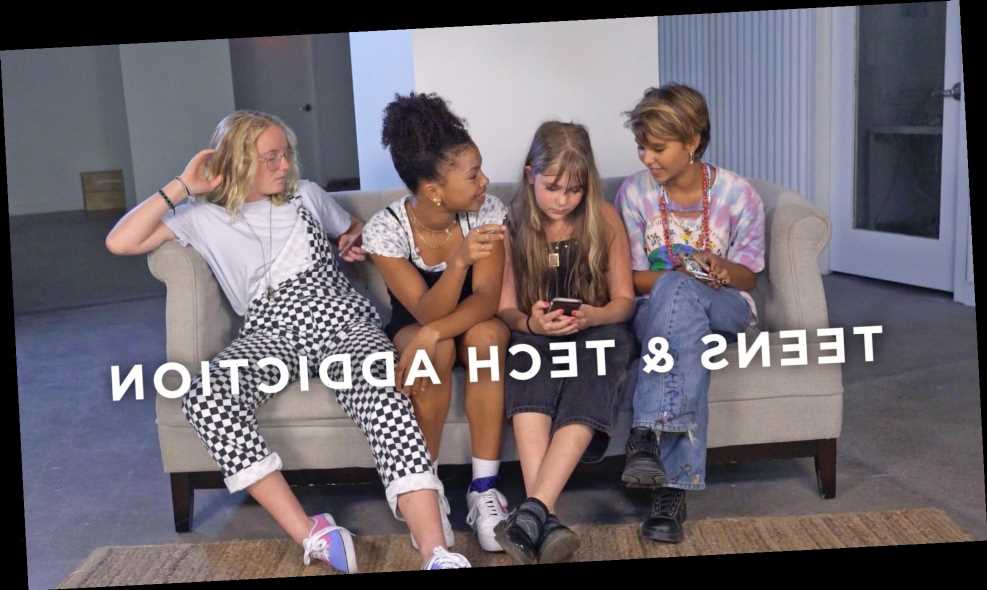It’s tough enough for most of us adults to step away from the iPhone — but what about teens, who have literally never known a world without internet? According to Common Sense Media, teens spend an average of 45 hours per week on their phones. Yep, their social media lives are a full-time job — even though, according to our recent survey of 400 parents for SheKnows’ Study on Kids & Technology (Dec 2019), parents think their teens only spend 22 hours per week on their phones.
We followed 25 kids for five years through our “Hatch: Raising GenZ” program to get their uncensored perspectives on tech and media and, hate to say it, it’s worse than we thought.
“I got Instagram in like first grade,” 14-year-old Juno tells SheKnows.
“I got Instagram when I was like 11 or 12 and I got really hooked…” Zaki chimes in. “I got a bunch of games as well and those were also, like, really addictive.”
“I feel like I wouldn’t have any friends if I didn’t have my phone,” 12-year-old Sabine told SheKnows.
“I’m very addicted to VR,” 10-year-old Clive told SheKnows.
“I wouldn’t be able to talk to anyone if I didn’t have Snapchat,” 14-year-old Evan adds. “I’d be completely isolated.”
Notice a pattern here? These kids don’t hesitate to reference the addictive nature of recreational technology (or “rec tech”). And parents agree; according to our Kids & Technology study, 50% of parents are concerned their child is actually addicted to tech, and an overwhelming 90% of parents agree that social media addiction can be as dangerous as a drug or alcohol addiction.
But is throwing around words like “addicted” and “hooked” hyperbolic, or are we dealing with real-life addiction symptoms here? Is screen time the new heroin?
In 2017, we conducted an experiment where we asked the Hatch kids to give up their phones for a whole week. Reactions varied, but nobody was happy about the ask. And the results start off looking glum: As you can see in the video below, Reed (bless her) constructed herself a fake phone; meanwhile Jack was moved to tears over his separation from YouTube.
“I need my phone to make me feel better, just for a minute!” begs 14-year-old Henry through tears. It’s honestly heartbreaking to watch.
Pediatrics professor Robert Lustig, MD, spoke at a Common Sense Media conference in 2018 and told attendees that screen time “is not a drug, but it might as well be. It works the same way…it has the same results,” Quartz reports.
A 2018 Pew Research Center report hits home what our Hatch interviews hint at: Even teens believe they’re addicted to their phones, and it’s becoming a real problem.
But watch the kids’ reactions during their phone-free week a bit longer, and it’s clear that simply removing the phones from their lives had a drastic, positive effect; they talk about how being phone-free is “actually much nicer” since they’re spending IRL time together instead of just “hanging out on our phones.” As for Evan, rather than his usual M.O. of spending “all day” on his phone, he “actually went outside,” he tells SheKnows, grinning.
“Other people Liking [a post],” explains Reed, feels equivalent to people saying “they like me as a person. I’m okay. I’m good.” Instagram’s plan to remove Likes from the platform will “take away the pressure of, do they like me or not?” she adds. And that can only be a good thing.
It’s high time we helped our kids — and ourselves, dammit — separate our lives from our Likes. And to their credit, these kids are trying. Jack explains that he has chosen to put a “cap” on his social media usage, so he can only use Instagram for one hour a day. Zaki, meanwhile, has eliminated all social platforms. “It definitely creates a divide between me and my friends,” he explains to SheKnows. But, it’s worth it, because “having social media definitely made me feel bad,” Zaki adds.
So what can parents do about it?
- Talk to kids/use it as a teaching opportunity. “When your child sees something creepy, weird or persuasive, or won’t answer when you’ve called their name five million times, talk about it with them,” Dr. Jenny Radesky, an assistant professor of developmental behavioral pediatrics, told the New York Times. “Demystify why it’s happening (and if you don’t know, try to look it up), and make them more digitally literate.”
- Require that phones be put away for dinner/before bedtime.
- Educate yourself and your teen on digital dangers like cyber bullying, and dangerous internet “challenges.”
- Notice how/whether tech is negatively impacting their life — and take steps if necessary. “If a kid is not getting enough sleep, or not getting homework done,” assistant professor of adolescent medicine at the University of Michigan Dr. Ellen Selkie told the Times.
But perhaps most important? Think about your own tech habits and how (or whether) you’re modeling healthy behaviors for your kids. We can’t expect our kids to commit to healthy tech use when we’re obsessively scrolling alongside the worst of them. So consider those 45 (!!) hours per week the wake-up call your whole family — not just the kids — needs to inspire a turnaround in how you use tech (or rather, how it uses you). Hey, ’tis the season for New Year’s resolutions, right?
Source: Read Full Article


